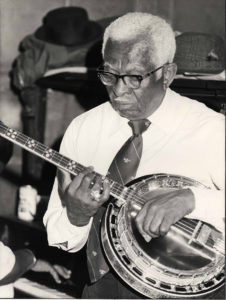Narvin Kimball
Narvin Kimball enjoyed a long career as a successful New Orleans jazz and swing musician.

Courtesy of Louisiana State Museum
Narvin Kimball. Joly, Marcel (Photographer)
Narvin Henry Kimball was a traditional jazz banjo player, bassist, and vocalist from New Orleans. The son of noted early jazz musician Henry Kimball (1878–1931), Kimball played with everyone from Paul Moliere and Fate Marable to Papa Celestin and Louis Armstrong during his storied career. The last living original member of the Preservation Hall Jazz Band, Kimball was displaced by Hurricane Katrina and died soon afterward in Charleston, South Carolina. His jazz funeral was held in 2006 in New Orleans.
Kimball was born on March 2, 1909. At a time when learning music on homemade instruments was commonplace in marginalized communities, the young Kimball made his first stringed instrument out of a cigar box. He then learned the ukulele and began learning banjo when his musician father bought the instrument for him in 1924. Kimball supplemented self-teaching on the banjo with guidance from his father and lessons from Willie Foster. Kimball played banjo in his high school band and soon joined Paul Moliere’s family band. While still in his teens, Kimball played a riverboat tour with Fate Marable on the steamer Capitol. Willie Humphrey, also a player in this ensemble, would play with Kimball often throughout his life.
After finishing high school, Kimball went on to New Orleans University (now Dillard University), where he studied for two years and played in a university band. In the late 1920s Kimball joined Sidney Desvigne’s orchestra. A short time later he became a member of Celestin’s Original Tuxedo Orchestra, in which he played banjo and guitar. Kimball’s first recording was with Celestin in December 1928 on Columbia Records. Working with Celestin’s band proved beneficial for Kimball both professionally and personally, as he married Jeannette Salvant, a pianist in the ensemble.
Even for someone at his level of playing, the Great Depression was particularly hard on musicians and artists; to make ends meet, Kimball was forced to take up work as a mailman, an occupation he would maintain for three decades. In 1940 he rejoined Desvigne’s orchestra, and in 1945 he performed on bass with Louis Armstrong at the National Jazz Foundation show in New Orleans. Around this time, one of Kimball’s own compositions, “Don’t Let Old Age Creep up on You,” was recorded on Decca by the Ink Spots.
After World War II Kimball helped organize a group called The Four Tones along with Fred Minor, Alvin Alcorn, and Louis Barbarin; that band enjoyed local notoriety for several years. In 1959 Kimball formed his own band, Kimball’s Gentlemen of Jazz, which had standing gigs at Bourbon Street’s Paddock Lounge and the Old Absinthe House.
Fondly remembered for his vocal rendition of “Georgia on My Mind,” Kimball joined the Preservation Hall Jazz Band at its inception as the youngest member, at fifty-seven. He died forty years later, on March 17, 2006, as its oldest member.
